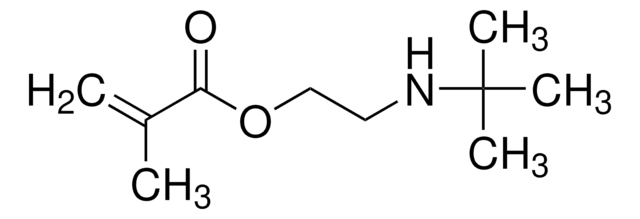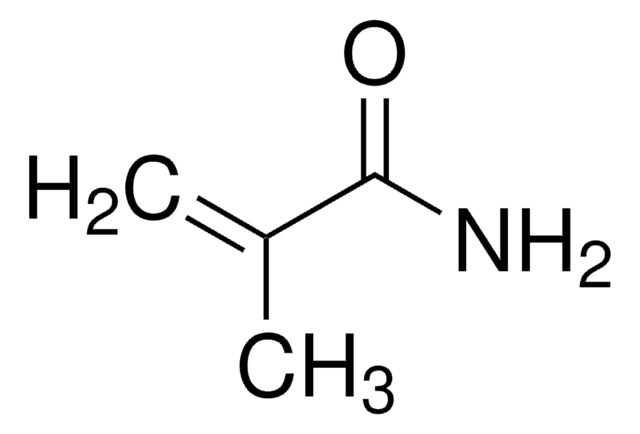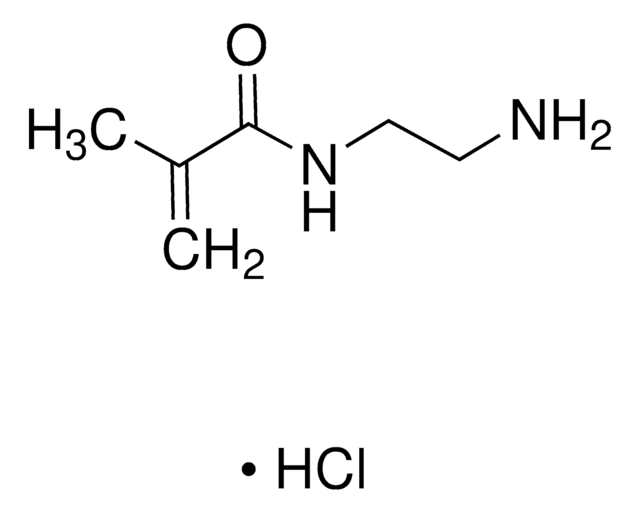409472
N-[3-(Dimethylamino)propyl]methacrylamide
99%, contains MEHQ as inhibitor
Synonyme(s) :
N ,N -Dimethylaminopropyl methacrylamide, N -[3-(N ,N -Dimethylamino)propyl]methacrylamide
About This Item
Produits recommandés
Niveau de qualité
Description
contains: ~650ppm MEHQ as inhibitor
Pureté
99%
Forme
viscous liquid
Indice de réfraction
n20/D 1.479 (lit.)
Point d'ébullition
134 °C/2 mmHg (lit.)
Densité
0.94 g/mL at 25 °C (lit.)
Chaîne SMILES
CN(C)CCCNC(=O)C(C)=C
InChI
1S/C9H18N2O/c1-8(2)9(12)10-6-5-7-11(3)4/h1,5-7H2,2-4H3,(H,10,12)
Clé InChI
GDFCSMCGLZFNFY-UHFFFAOYSA-N
Description générale
Application
- Glucose-containing diblock polycations exhibit molecular weight, charge, and cell-type dependence for pDNA delivery.: This study investigates the use of glucose-containing diblock polycations, including N-[3-(Dimethylamino)propyl]methacrylamide, in pDNA delivery systems. The research demonstrates that the efficiency of pDNA delivery is influenced by the molecular weight and charge of the polycations, as well as the type of cell used. This highlights the potential for tailored gene delivery applications in different cell types, emphasizing the role of N-[3-(Dimethylamino)propyl]methacrylamide in creating biocompatible and effective delivery vectors (Wu et al., 2014).
- As a monomer to synthesize self-healing pH-responsive P(DMAPMA-stat-DAA) hydrogels for drug delivery applications.
- As a cationic monomer to develop gene delivery vector due to its ability to complex with nucleic acids and facilitate their intracellular delivery.
- To fabricate iron oxide nanoparticle formulations for 3D printing. These iron inks are utilized for printing magnetic devices, MRI contrast agents for bioimaging and targeted drug delivery systems.
- To prepare a non-toxic synthetic flocculant for harvesting microalgae.
Mention d'avertissement
Danger
Mentions de danger
Conseils de prudence
Classification des risques
Eye Dam. 1 - Skin Irrit. 2 - Skin Sens. 1
Code de la classe de stockage
10 - Combustible liquids
Classe de danger pour l'eau (WGK)
WGK 1
Point d'éclair (°F)
264.2 °F - closed cup
Point d'éclair (°C)
129 °C - closed cup
Équipement de protection individuelle
Eyeshields, Gloves, type ABEK (EN14387) respirator filter
Certificats d'analyse (COA)
Recherchez un Certificats d'analyse (COA) en saisissant le numéro de lot du produit. Les numéros de lot figurent sur l'étiquette du produit après les mots "Lot" ou "Batch".
Déjà en possession de ce produit ?
Retrouvez la documentation relative aux produits que vous avez récemment achetés dans la Bibliothèque de documents.
Les clients ont également consulté
Notre équipe de scientifiques dispose d'une expérience dans tous les secteurs de la recherche, notamment en sciences de la vie, science des matériaux, synthèse chimique, chromatographie, analyse et dans de nombreux autres domaines..
Contacter notre Service technique

![[2-(Methacryloyloxy)ethyl]trimethylammonium chloride solution 75 wt. % in H2O](/deepweb/assets/sigmaaldrich/product/structures/316/612/66b0f4cf-d060-427d-b4f5-e8fab3e5cffe/640/66b0f4cf-d060-427d-b4f5-e8fab3e5cffe.png)












![[2-(Methacryloyloxy)ethyl]dimethyl-(3-sulfopropyl)ammonium hydroxide 95%](/deepweb/assets/sigmaaldrich/product/structures/217/219/73c91e1c-0ee4-4b3d-bead-a6dc3d09d1da/640/73c91e1c-0ee4-4b3d-bead-a6dc3d09d1da.png)